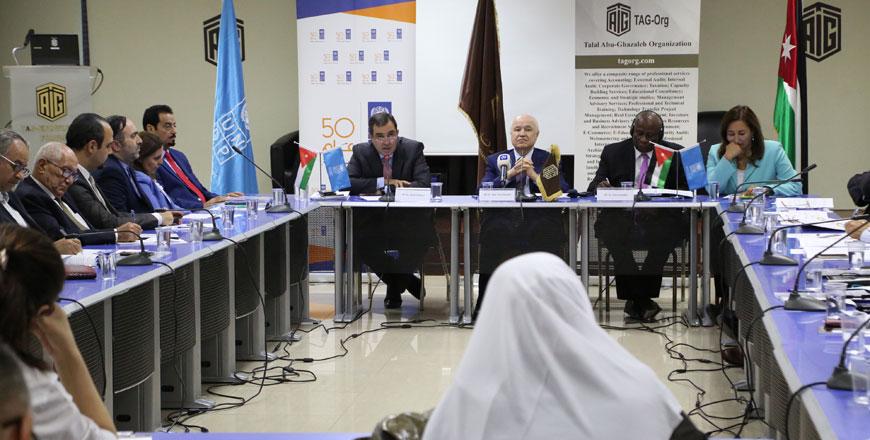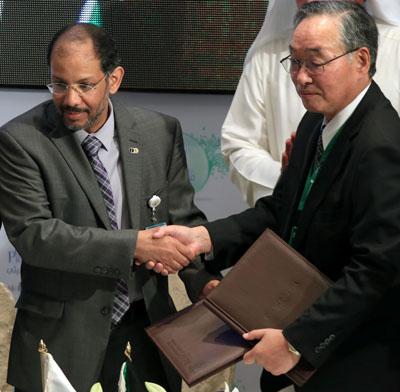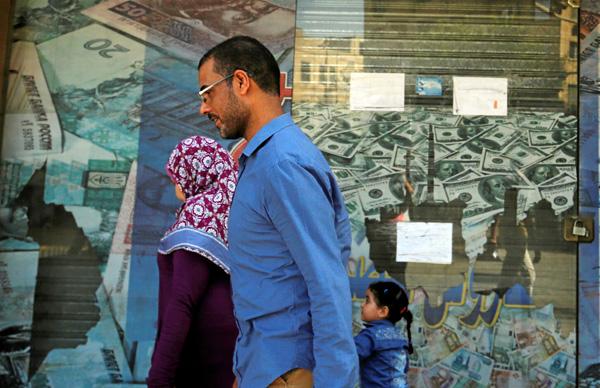You are here
Kingdom incurs more than $12b as indirect cost of refugee crisis — study
By JT - Sep 08,2016 - Last updated at Sep 08,2016

Planning and International Cooperation Minister Imad Fakhoury (left), Talal Abu Ghazaleh, president of Talal Abu Ghazaleh Group (centre) and UN Resident and Humanitarian Coordinator Edward Kallon launch a study on the impacts of the Syrian crisis on Jordan in Amman on Thursday (Photo courtesy of Ministry of Planning and International Cooperation)
AMMAN — The total cost of indirect economic impact of the Syrian crisis on Jordan between 2013 and 2016 has reached $12.37 billion, a Planning and International Cooperation Ministry study revealed Thursday.
Funded by the UNDP office in Jordan, the study, dubbed, "The Indirect Impacts of the Syrian Crisis on Jordan’s Economy: A Quantitative and Qualitative Approach”, was implemented by Abu Ghazaleh Consulting, according to a ministry statement.
Planning and International Cooperation Minister Imad Fakhoury said the timing of the study is important, because it coincides with the UN General Assembly (UNGA) meetings this month and the conference on refugee crisis, and will be an effective tool for Jordan to ask for international assistance.
He also highlighted the study as a credible source when indirect impacts incurred by the government as a result of the Syrian crisis are calculated.
The minister also noted that the government is cooperating with the UN and other international agencies to scientifically and statistically document all the needs of host communities.
The Jordan Response Plan to deal with the Syrian crisis has shown, with data and statistics, that the Kingdom has been facing numerous challenges as a result of the crisis, he said, including a notable decline in the GDP growth and mounting budget and trade deficits, along with increased competition over jobs and affordable housing.
Other challenges include pressure on the budget due to additional security costs, subsidies and income loss, as well as major risks posed to social cohesion and stability, and an increase in absolute poverty in refugee-impacted governorates like Mafraq and Irbid (up to 14.4% of the local population).
Talal Abu Ghazaleh said that the study focussed solely on the indirect impacts of the Syrian crisis, noting that the 2008 Geneva Declaration defines indirect losses as missed resources and opportunities as a result of armed conflicts.
UN Resident and Humanitarian Coordinator Edward Kallon said that the UNDP has since the beginning of the crisis called for supporting Jordanian host communities and guest refugees.
In this regard, he noted that UNDP’s office in Jordan in 2012 launched a support programme that mainly targeted the governorates of Irbid, Mafraq and Zarqa, where the majority of Syrians reside (85 per cent live outside camps).
Kallon noted that the programme included a package of support tools that focus on enhancing living standards and municipal services with a total cost of $70 million, in addition to supporting more than 3 million people, the statement added.
Related Articles
GENEVA — Just like Hannibal in ancient times, Swiss engineers have conquered the Alps.More than 2,200 years after the commander from the anc
The Kuwait National Petroleum Company (KNPC) on Sunday signed contracts worth $12 billion (nine billion euros) with three international consortia to upgrade two refineries and invited bids to build a new multi-billion-dollar refinery.
WASHINGTON — International Monetary Fund (IMF) chief Christine Lagarde said Tuesday she will recommend the institution approve a $12 billion


















